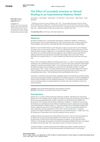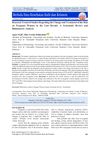
The study aims to create a model to improve personalized and preventive health care.
2 citations,
January 2021 in “Clinical dermatology review” Modified PRP therapy successfully treated severe alopecia unresponsive to traditional methods.
January 2019 in “Journal of Dermatology and Dermatologic Surgery” Wearing headcovers doesn't affect male-pattern hair loss severity.
 March 2023 in “Seminars in reproductive medicine”
March 2023 in “Seminars in reproductive medicine” PCOS often leads to sleep problems, especially obstructive sleep apnea, affecting overall health.
 3 citations,
July 2021 in “Aesthetic Plastic Surgery”
3 citations,
July 2021 in “Aesthetic Plastic Surgery” PHAT may improve hair growth better than PRP alone.
 August 2024 in “Frontiers in Pharmacology”
August 2024 in “Frontiers in Pharmacology” Antibody treatments show promise for hair loss but need more research.
 April 2024 in “Deleted Journal”
April 2024 in “Deleted Journal” Scalp pain should be classified as a type of headache.
 57 citations,
June 2021 in “Polymers”
57 citations,
June 2021 in “Polymers” Photothermal hydrogels are promising for infection control and tissue repair, and combining them with other treatments could improve results and lower costs.
 14 citations,
March 2022 in “Journal of inflammation research”
14 citations,
March 2022 in “Journal of inflammation research” Baricitinib shows promise as a new treatment for certain skin conditions like alopecia areata.
 14 citations,
July 2021 in “Biomedicines”
14 citations,
July 2021 in “Biomedicines” Platelet-rich treatments can help improve wound healing and tissue repair.
 1 citations,
June 2023 in “International journal of basic science in medicine”
1 citations,
June 2023 in “International journal of basic science in medicine” Adiantum capillus-veneris may help with respiratory issues, but more research is needed.

Women with PCOS have lower self-esteem and body image satisfaction.
 April 2024 in “International Journal of Research Publication and Reviews”
April 2024 in “International Journal of Research Publication and Reviews” Alopecia areata causes hair loss with varied treatment responses and frequent relapses.
 5 citations,
January 2022 in “Clinical cancer investigation journal”
5 citations,
January 2022 in “Clinical cancer investigation journal” Certain Dibenzo derivatives may help treat prostate cancer.
 3 citations,
November 2022 in “Frontiers in oncology”
3 citations,
November 2022 in “Frontiers in oncology” Low zinc levels may be linked to the return of gynecologic cancers.
 2 citations,
June 2020 in “AIDS”
2 citations,
June 2020 in “AIDS” Recreational drug use can cause misdiagnosed conditions and drug interactions in HIV patients.
 1 citations,
October 2023 in “Clinical, cosmetic and investigational dermatology”
1 citations,
October 2023 in “Clinical, cosmetic and investigational dermatology” Traditional treatment for pediatric alopecia areata is most effective and should be first choice.
 1 citations,
September 2023 in “Curēus”
1 citations,
September 2023 in “Curēus” Lavandula stoechas helps wounds heal faster in diabetic and non-diabetic rats.
 August 2023 in “International journal of research in dermatology”
August 2023 in “International journal of research in dermatology” Janus kinase inhibitors are effective and generally safe for treating hair loss in adults with alopecia areata.
 March 2024 in “Cytologia”
March 2024 in “Cytologia” LncRNA MTC boosts growth of goat skin cells, improving cashmere quality.
 December 2023 in “Health economics and management review”
December 2023 in “Health economics and management review” Radiographers in private hospitals face many health issues due to heavy workloads and long hours.
 November 2023 in “Berkala Ilmu Kesehatan Kulit dan Kelamin/Berkala ilmu kesehatan kulit dan kelamin (Periodical of dermatology and venerology)”
November 2023 in “Berkala Ilmu Kesehatan Kulit dan Kelamin/Berkala ilmu kesehatan kulit dan kelamin (Periodical of dermatology and venerology)” Addressing skin changes during pregnancy is important to reduce stress for expectant mothers.
 May 2023 in “Journal of Pharmaceutical Research”
May 2023 in “Journal of Pharmaceutical Research” Neem is highly beneficial for health and beauty with no major side effects.
 April 2021 in “Sohag Medical Journal”
April 2021 in “Sohag Medical Journal” Alopecia areata is an autoimmune condition causing hair loss, linked to genetic factors and immune system issues, with no cure yet.
 14 citations,
November 2020 in “International Journal of Molecular Sciences”
14 citations,
November 2020 in “International Journal of Molecular Sciences” Advanced therapies like gene, cell, and tissue engineering show promise for hair regrowth in alopecia, but their safety and effectiveness need more verification.
 8 citations,
September 2022 in “Biointerface Research in Applied Chemistry”
8 citations,
September 2022 in “Biointerface Research in Applied Chemistry” Quinoline alkaloids from Cinchona may help treat cancer, diabetes, fungal infections, and promote hair growth.
 3 citations,
April 2022 in “Farmacia”
3 citations,
April 2022 in “Farmacia” Certain foods and supplements can help treat skin diseases alongside medication.
 1 citations,
July 2022 in “Case reports in endocrinology”
1 citations,
July 2022 in “Case reports in endocrinology” A 70-year-old woman with a malignant adrenal tumor improved after surgery and radiotherapy.
 1 citations,
February 2022 in “Online journal of biological sciences”
1 citations,
February 2022 in “Online journal of biological sciences” The document does not determine if adults with aphallia are fertile.
1 citations,
March 2021 in “medRxiv (Cold Spring Harbor Laboratory)” Many males in Jordan misuse oral contraceptive pills for hair growth, muscle gain, and acne treatment.


























